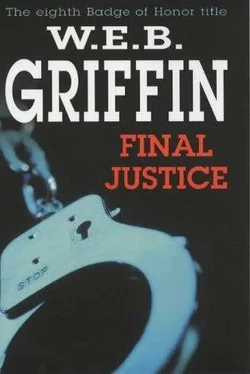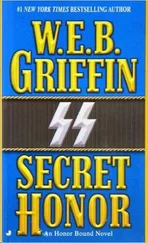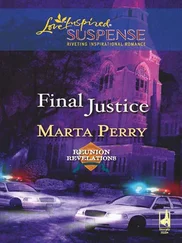W. Griffin - Final Justice
Здесь есть возможность читать онлайн «W. Griffin - Final Justice» весь текст электронной книги совершенно бесплатно (целиком полную версию без сокращений). В некоторых случаях можно слушать аудио, скачать через торрент в формате fb2 и присутствует краткое содержание. Жанр: Полицейский детектив, на английском языке. Описание произведения, (предисловие) а так же отзывы посетителей доступны на портале библиотеки ЛибКат.
- Название:Final Justice
- Автор:
- Жанр:
- Год:неизвестен
- ISBN:нет данных
- Рейтинг книги:3 / 5. Голосов: 1
-
Избранное:Добавить в избранное
- Отзывы:
-
Ваша оценка:
- 60
- 1
- 2
- 3
- 4
- 5
Final Justice: краткое содержание, описание и аннотация
Предлагаем к чтению аннотацию, описание, краткое содержание или предисловие (зависит от того, что написал сам автор книги «Final Justice»). Если вы не нашли необходимую информацию о книге — напишите в комментариях, мы постараемся отыскать её.
Final Justice — читать онлайн бесплатно полную книгу (весь текст) целиком
Ниже представлен текст книги, разбитый по страницам. Система сохранения места последней прочитанной страницы, позволяет с удобством читать онлайн бесплатно книгу «Final Justice», без необходимости каждый раз заново искать на чём Вы остановились. Поставьте закладку, и сможете в любой момент перейти на страницу, на которой закончили чтение.
Интервал:
Закладка:
There were now the sounds of approaching sirens, at least two, probably three, maybe more.
“They shot somebody in the kitchen, too,” one of the restaurant patrons called out.
Sergeant Carter looked around to see who had called out, and when he did, one of the patrons, a very tall, very thin, hawk-featured black man, stood up and pointed to the kitchen.
Sergeant Carter headed for the rear of the restaurant. Mickey followed him, holding the digital camera in his hand, concealing it as well as he could.
Carter pushed open the door and went in the kitchen. Mickey caught it before it closed and followed him in.
There was a body of a chubby woman, some kind of Latina, on the floor, her head distorted and lying in a pool of blood.
“Jesus Christ!” Sergeant Carter said.
“One of them came in the kitchen,” a young black guy in kitchen whites said. “Manuela was calling the cops. He shot her.”
“They all gone?” Carter asked.
“There was just the two of them,” the young black guy said. “They’re gone.”
“You get a good look at him? Them?”
The young black guy nodded.
Carter went back into the dining room.
Mickey didn’t follow him. He took a picture of the young black guy, then held up his finger, signaling him not to go anywhere, and then took two pictures, different angles, of the body on the floor.
Then he slipped the digital camera into his pocket.
“What’s your name?” he asked.
“Amal al Zaid.”
“You want to spell that for me?” Mickey asked, and wrote it down, and then asked where he lived.
Then he asked Amal al Zaid what had happened, and had just about finished writing that down when three other police officers entered the kitchen-a lieutenant, a detective, and a uniform.
Lieutenant Stanley J. Wrigley was acquainted with Mr. O’Hara.
“Jesus Christ, Mickey, how did you get in here?” he asked.
“I got here before Highway,” Mickey replied. “The doers were two black guys. Carter put out a flash.”
“You have to get out of here, Mickey, you know that,” Lieutenant Wrigley said.
“Yeah.”
“Do me a favor,” Wrigley said. “Go out the back door. Otherwise the rest of the media will bitch you’re getting special treatment again.”
“Yeah, sure, Stan.”
“You get a pretty good look at the doers?” the detective asked.
“Not good. Two young black guys, one of them short and fat.”
“You told that to Carter?” Wrigley asked.
Mickey nodded.
“Thanks, Mick,” Wrigley said, and O’Hara went to the rear door of the kitchen and went through it.
THREE
Twelve minutes later, Mickey O’Hara walked into his glass-walled office just off the city room of the Philadelphia Bulletin, adjusted the venetian blinds over the glass of the windows and doors so that he could not be seen from the city room, locked the door, and then sat down at his personal computer, switched it on, and waited for it to boot up.
He had two computers. One was tied into the Bulletin’s network, and the other was his personally. While he was waiting for his personal computer to boot up, he spun around in his chair and faced the Bulletin computer terminal keyboard and rapidly typed:
CEHold me space for the double murder at the Roy Rogers. I was there and may have pics. O’Hara
He read what he had typed, then pushed the Send key.
Then he spun around in his chair again and faced his own computer. This state-of-the-art device, which fell under the provisions of his contract for personal services with the Bulletin, requiring the Bulletin to provide him with “whatever electronic devices and other tools he considered necessary to the efficient performance of his duties,” was brand new. It had a twenty-one-inch liquid crystal diode color monitor, and provided more than a hundred different typefaces, each clearer and more legible than the single typeface available on the Bulletin’s computer terminals.
Mickey took his digital camera-another $1,200 electronic device he considered necessary for the performance of his duties-from his trouser pocket, carefully removed the memory chip, replaced it with another $79.95 64-megabyte memory chip, and shoved the chip he had removed into the mouth-it reminded him of a feeding goldfish-of a device connected to the keyboard of his computer.
He tapped some keys, which caused the JPG images on the memory chip to be transferred into his computer. The quick tapping of more keys brought the images up on the LCD monitor.
He then removed the memory chip from the goldfish’s mouth, unlocked a drawer in his desk and unlocked a metal box in the drawer, dropped the memory chip into it, relocked it, closed the desk drawer, and relocked that.
Mickey was thinking of writing a book-Casimir Bolinski said he was sure he could sell it for him “for big bucks, Mick, if you ever get off your lazy Irish ass and write a proposal”-and if he did, he would need the pictures.
He tapped keys again and a photo-editing program came up on the LCD monitor’s screen. The first picture, of the two black guys coming out of the Roy Rogers, appeared.
It was really a lousy picture, understandable in the circumstances.
For one thing, he had thrown the viewfinder to his eye with such haste that the picture was cockeyed; the two doers appeared in the lower right quarter of the picture, and only from the waist up.
Far worse, the camera’s internal light meter had detected the bright light coming from the door, decided that was the ambient light, and set the camera accordingly. The entrance to the restaurant appeared in near perfect clarity, but the two doers were not in the light from the door, and consequently they could hardly be seen. You could see it was two guys, but you couldn’t see any facial details.
Mickey quite skillfully tried to fix it, using all of the capabilities of the photo-editing program. He “lightened” the two guys. That didn’t work. Neither did darkening the perfectly captured restaurant entrance. He tried everything else he could think of, but nothing worked.
Finally he gave up. He cropped out the unnecessary background, typed keys that renamed “00001. JPG” to “Doers-XRR. JPG,” then pressed the Enter key. Then he pushed other keys, which ordered yet another electronic device necessary to the performance of his duties to print three copies, eight by ten inches, 1,200 dots per square inch. A $5,300 electronic device hummed and clicked as it began to execute the order.
00002. JPG and 00003. JPG-the pictures of the body of Officer Kenneth J. Charlton, the poor bastard, lying dead at the entrance of the Roy Rogers-also required editing.
He first made a copy of each as they had come from the camera, renaming them Chardwn1. JPG and Chardwn2. JPG respectively, and ordered three eight-by-ten copies of each at 1,200 dots per square inch.
Then he went back to each picture in turn, cropped out unnecessary background, very carefully edited the picture so that Officer Charlton’s eyes appeared to be closed, not twisted in agony, and then made the pool of blood in which Charlton’s head was lying disappear. He then renamed these pictures Charbul1. JPG and Charbul2. JPG, ordered the printing of one eight-by-ten of each, and also sent the pictures by the Internet to O’Hara@PhillyBulletin. com.
He did much the same thing with the other pictures-those of that poor dame in the kitchen and the young black kid- that he had made with the digital camera.
Although a somewhat complicated process, doing everything took him less than ten minutes. He had a good deal of experience doing the same sort of thing, and of course he had, literally, the best equipment the Bulletin’s money could buy to do it with.
Читать дальшеИнтервал:
Закладка:
Похожие книги на «Final Justice»
Представляем Вашему вниманию похожие книги на «Final Justice» списком для выбора. Мы отобрали схожую по названию и смыслу литературу в надежде предоставить читателям больше вариантов отыскать новые, интересные, ещё непрочитанные произведения.
Обсуждение, отзывы о книге «Final Justice» и просто собственные мнения читателей. Оставьте ваши комментарии, напишите, что Вы думаете о произведении, его смысле или главных героях. Укажите что конкретно понравилось, а что нет, и почему Вы так считаете.











